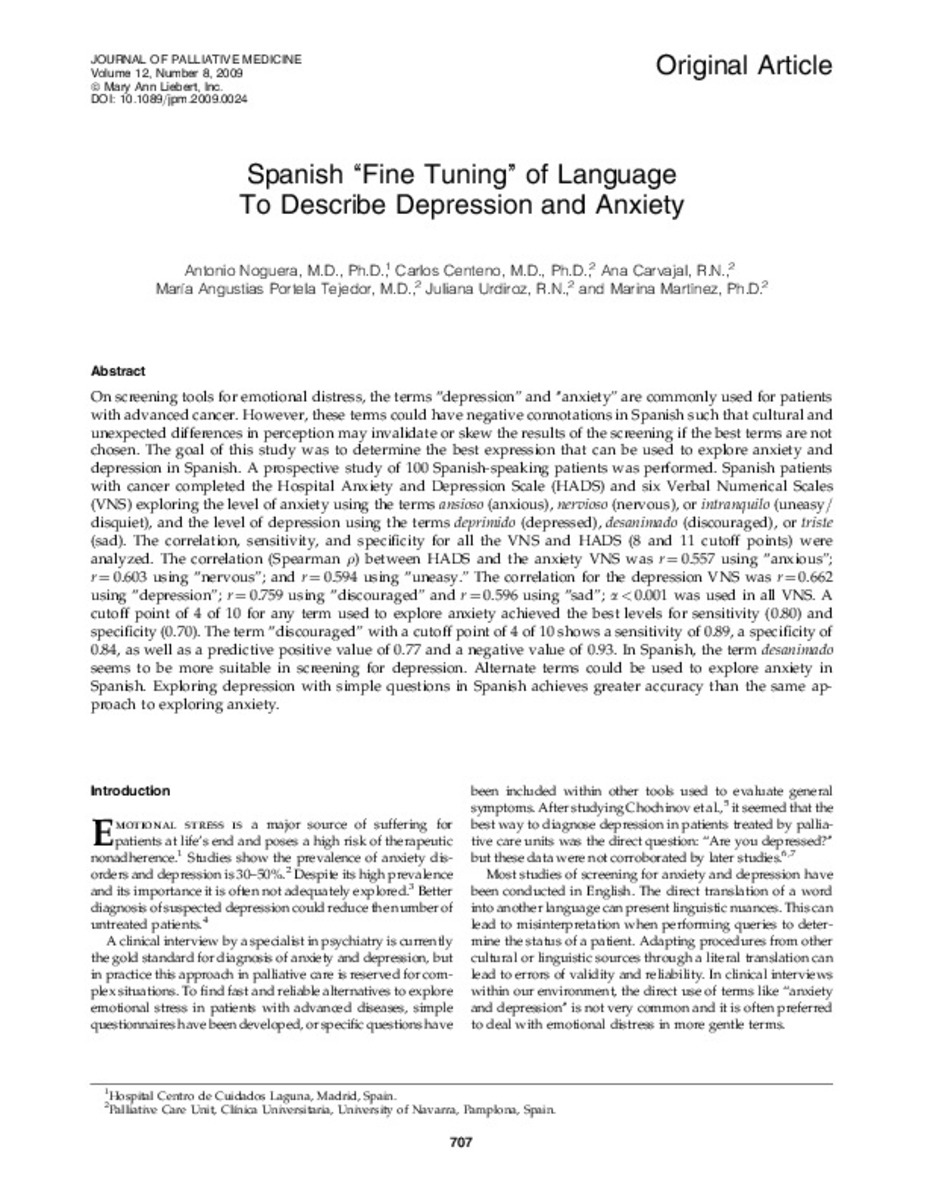Full metadata record
| DC Field | Value | Language |
|---|---|---|
| dc.creator | Noguera, A. (Antonio) | - |
| dc.creator | Centeno, C. (Carlos) | - |
| dc.creator | Carvajal, A. (Ana) | - |
| dc.creator | Portela, M.A. (María Angustias) | - |
| dc.creator | Urdiroz, J. (Julia) | - |
| dc.creator | Martínez, M. (Marina) | - |
| dc.date.accessioned | 2014-05-06T07:47:03Z | - |
| dc.date.available | 2014-05-06T07:47:03Z | - |
| dc.date.issued | 2009 | - |
| dc.identifier.citation | Noguera A, Centeno C, Carvajal A, Portela Tejedor M, Urdiroz J, Martínez M. Spanish ""fine tuning"" of language to describe depression and anxiety. J Palliat Med 2009 08;12(8):707-712. | es_ES |
| dc.identifier.issn | 1096-6218 | - |
| dc.identifier.uri | https://hdl.handle.net/10171/35826 | - |
| dc.description.abstract | On screening tools for emotional distress, the terms "depression" and "anxiety" are commonly used for patients with advanced cancer. However, these terms could have negative connotations in Spanish such that cultural and unexpected differences in perception may invalidate or skew the results of the screening if the best terms are not chosen. The goal of this study was to determine the best expression that can be used to explore anxiety and depression in Spanish. A prospective study of 100 Spanish-speaking patients was performed. Spanish patients with cancer completed the Hospital Anxiety and Depression Scale (HADS) and six Verbal Numerical Scales (VNS) exploring the level of anxiety using the terms ansioso (anxious), nervioso (nervous), or intranquilo (uneasy/disquiet), and the level of depression using the terms deprimido (depressed), desanimado (discouraged), or triste (sad). The correlation, sensitivity, and specificity for all the VNS and HADS (8 and 11 cutoff points) were analyzed. The correlation (Spearman rho) between HADS and the anxiety VNS was r = 0.557 using "anxious"; r = 0.603 using "nervous"; and r = 0.594 using "uneasy." The correlation for the depression VNS was r = 0.662 using "depression"; r = 0.759 using "discouraged" and r = 0.596 using "sad"; alpha < 0.001 was used in all VNS. A cutoff point of 4 of 10 for any term used to explore anxiety achieved the best levels for sensitivity (0.80) and specificity (0.70). The term "discouraged" with a cutoff point of 4 of 10 shows a sensitivity of 0.89, a specificity of 0.84, as well as a predictive positive value of 0.77 and a negative value of 0.93. In Spanish, the term desanimado seems to be more suitable in screening for depression. Alternate terms could be used to explore anxiety in Spanish. Exploring depression with simple questions in Spanish achieves greater accuracy than the same approach to exploring anxiety. | es_ES |
| dc.language.iso | eng | es_ES |
| dc.publisher | Mary Ann Liebert | es_ES |
| dc.rights | info:eu-repo/semantics/openAccess | es_ES |
| dc.subject | Depression | es_ES |
| dc.subject | Anxiety | es_ES |
| dc.subject | Spanish language | es_ES |
| dc.subject | Terms | es_ES |
| dc.subject | Connotations | es_ES |
| dc.title | Spanish "fine tuning" of language to describe depression and anxiety | es_ES |
| dc.type | info:eu-repo/semantics/article | es_ES |
| dc.identifier.doi | http://dx.doi.org/10.1089/jpm.2009.0024 | es_ES |
Files in This Item:
Statistics and impact
Items in Dadun are protected by copyright, with all rights reserved, unless otherwise indicated.






